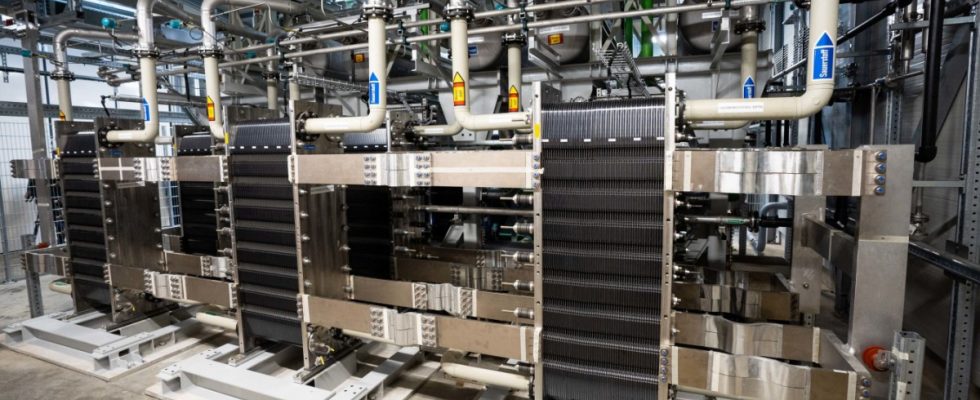For months, Bavaria’s largest plant for green hydrogen was largely idle – now production in Wunsiedel in Upper Franconia will soon go into regular operation. During the course of August, they wanted to produce significant amounts of hydrogen, said managing director Philipp Matthes. By the end of the year, production should then be gradually increased.
The so-called electrolysis plant had already started operating in September 2022 and Prime Minister Markus Söder (CSU) even described it as “pioneering work for Germany and Europe”. But shortly thereafter it was largely over. Basically, you haven’t produced a week in a row, said Matthes. The reason: The operation of the system became unprofitable due to the electricity price brake and the associated skimming off of surplus income from electricity producers.
In the plant, water is broken down into its components, hydrogen and oxygen, using electricity. So that this is economically possible – and “green hydrogen” can be produced – the company relies on climate-friendly and usually cheap electricity from wind and sun. However, due to the electricity price brake, electricity producers have to reckon with a revenue skimming, which is calculated on the basis of the high prices on the electricity exchange. Because the regulation will not be extended and will therefore expire on June 30th, the plant in Upper Franconia has an economic perspective again.
The previous dry spell was not without consequences. The past few months have drained the reserves, said Matthes. The previously planned expansion of the plant’s capacity will be severely delayed as a result, although it remains a goal. When they found out that the regulation was expiring, they immediately resumed talks with regional electricity providers. Customers in the regional economy for the hydrogen produced are also still available. These should include the glass and ceramics industry, transport companies and automotive suppliers.
The system in Wunsiedel has an output of around nine megawatts. For comparison: according to industry information, a wind turbine had an average output of almost 5.3 megawatts at the end of 2022. Bavaria’s Economics Minister Hubert Aiwanger (free voters) had previously repeatedly tried to get exceptions for operators of electrolysis plants and an earlier end to the regulations on skimming off profits from electricity producers, but had been unsuccessful. On Monday, Aiwanger described the extensive standstill of the plant as a “poet by the federal government”. The federal government also invests millions in this production facility and then shuts it down for months because it is unable to issue an exception that he has urgently asked for. “This is how you destroy money and trust in the energy transition.”

